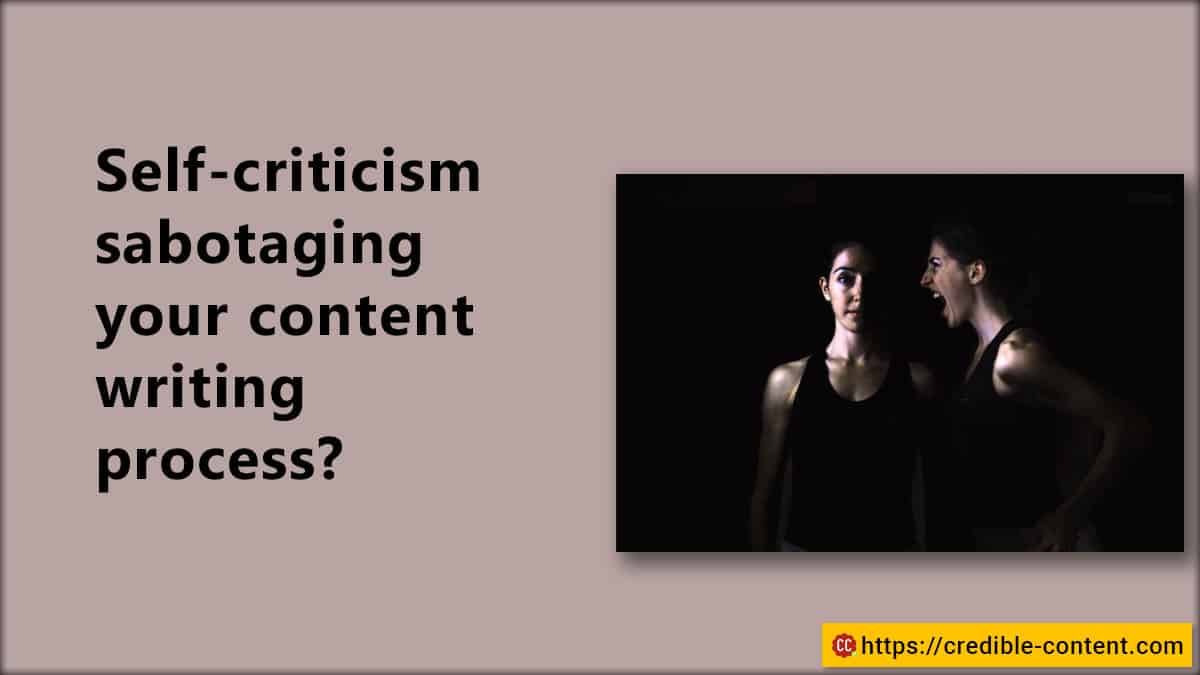Self-criticism isn’t just toxic, sometimes it can be devastating.
Different toppings and subtopics discussed in this blog:
- Why does self-criticism raise its head when writing content?
- Content writing and confidence go hand-in-hand
- Techniques for subduing self-criticism as a content writer
Do you want to become a successful content writer?
Unconsciously, self-criticism might be one of the biggest roadblocks that you don’t even know you face.
It creeps up on you slowly and gnaws at your content writing process unbeknownst to you.
You think that other content writers are better than you?
You are unable to negotiate prices because you begin to believe you don’t deserve to be paid much.
You assume you don’t understand the topic.
You worry that you won’t be able to meet the deadline.
I have written professional content for more than 17 years.
Even now, whenever I am about to begin a new content writing project, I’m filled with self-doubt and besieged by a wave of self-criticism.
Whenever I receive a new query, I wonder whether I will be able to deliver what the client needs.
I suffer from the imposter syndrome.
The inner voice tells me: you are not good.
You are deceiving your client.
You are pretending to be a good content writer.
Though, over the years, I have developed some techniques to beat the demons of self-criticism.
Why does self-criticism raise its head when writing content?
Self-criticism is natural.
It is good in small, manageable doses.
It keeps you on your toes.
It pushes you to improve and better yourself.
Hence, a little of it doesn’t harm you much and in fact, does you good.
In fact, I often come across content writers who definitely need some self-criticism.
Their writing is really bad.
Still, they act as if they are writing for the New York Times on a regular basis.
Even that level of confidence can be toxic.
Self-criticism on the other hand exists in the form of wanting to better yourself.
At a fundamental level I know I write better than many people.
I write good sentences.
I am confident of my writing style.
I can express any complicated idea simply.
My self-criticism originates from the fact that I may not have enough information to write what I’m supposed to write.
I may not have the appropriate vocabulary to work on a specific project.
I’m not good enough to get published in reputed publications.
My self-doubt doesn’t originate from the inability to express myself.
In different people, different types of self-doubt and self-criticism exist.
The problem with content writers is that they need to get paid for their writing per document or per assignment.
The client is instantly going to judge how the content writer has written.
There is always a fear of rejection.
There is always a chance that the client may think that the writing is not worth paying for.
Most of the content writers are underpaid so there is always this financial insecurity looming large at the horizon.
Gradually, self-criticism attains such a proportion that it begins to sabotage your entire content writing process.
Content writing and confidence go hand-in-hand
Remember that when you are writing content, you are writing for businesses and individuals who are running businesses.
Your content writing must instill confidence among your readers.
If your content writing lacks confidence, it will show through your words and sentences.
You will sound stiff and unsure.
You will convey the same feeling to your readers.
Your words have a magical way of communicating your true feelings.
Hence, to write with conviction, you must build your confidence.
Confidence comes with knowledge.
It comes with experience.
It comes with a core set of beliefs within you.
The best way to build your confidence as a writer is to write.
Write when you get work.
Write even when you don’t have paid assignments.
If you write only when you are paid, your writing becomes stilted.
Think like any other performing art.
Does a singer sing only when he or she is performing in front of an audience?
No.
He or she practices every day.
Do athletes perform athletic fetes only during sporting events?
No.
They practice for hours every day.
Practice writing every day.
In fact, write for 2-3 hours every day, whether you have professional content writing assignments or not.
Techniques for subduing self-criticism as a content writer
As I have written above, little bit of self-criticism can be used constructively.
It prompts you to excel.
It encourages you to better yourself.
But lots of self-criticism can be harmful.
When it stops you from writing, when it begins to meddle with your content writing process, you need to take some measures to control it.
Here are a few things you can do:
Distinguish between being critical and being self-critical
Sometimes we are critical of ourselves.
This is different from being critical about your work.
You certainly need to review your work.
Sometimes I revise documents multiple times.
I edit sentences.
I change words.
Complete rewrites are needed sometimes.
This shouldn’t be confused with self-criticism.
Even writers who have sold millions of books have editors.
Their books are revised multiple times.
So, each time you find an error, or you need to revise a sentence, don’t self-criticise yourself.
This is integral part of content writing.
Acquire knowledge of content writing
As I have written above, knowledge is empowering.
The more you know, the better you write.
Read books on content writing and copywriting.
Join LinkedIn forums on writing, content writing and copywriting.
Interact with other content writers and copywriters.
Follow blogs on the same topics.
Learn the latest about SEO copywriting.
I’m working with multiple writers these days.
Many writers write like content writers who used to write 10-15 years ago.
They haven’t updated their styles.
They haven’t upgraded their language skills.
Although they write well, they can do much better if they keep an eye on the latest trends in content writing and online copywriting.
Never shy away from learning and acquiring knowledge.
People in every profession are constantly learning.
The same is true in the field of content writing.
Start a personal blog
Starting a personal blog means updating it, not if every day, but at least a couple of times in a week.
I have found that blogging is one of the best ways to beat self-criticism.
Choose a topic that is close to your heart.
It doesn’t have to be a professional topic.
This is my blog on content writing and copywriting, but I also have a personal blog where I share my passion on books, religion, politics, and other topics.
On a personal blog I can write in whichever manner I feel like.
Even if people judge me, I don’t really care because my livelihood does not depend on my personal blog.
I get to express myself.
I get to practice my art of writing.
I have a small fan following that raises my confidence.
I get to build my own writing style.
But, it requires work.
You need to update your personal blog on regular basis.
Don’t constantly compare yourself with other content writers
Comparing yourself with other content writers can be positive or negative.
When you compare to learn, it is positive.
When you compare to discourage yourself, it is negative.
It is fine if another content writer writes better than you.
It is fine if his or her range of vocabulary is vast.
It is all about learning.
It is all about regularly practising your art.
It is all about acquiring knowledge.
If that particular content writer can write so well, so can you.
You are not there yet, but soon you will be.
You are already writing.
You have already reached a certain level.
Now you need to improve.
As you gain more experience, your writing will improve.
It has improved till now, it will improve further.
Learn to do research
A lot of times you are hit by a deluge of self-criticism when you cannot find the right information that you need to write content.
For every content writing project you need to research.
You need to find information.
Google may be your best friend.
It has advanced search features that can help you filter out unnecessary information.
You may need to use different queries to find exactly the information you are looking.
Sometimes, a seemingly impossible topic becomes crystal clear once you have done some research.
Also develop a system of storing information when you’re researching so that the next time when you need to find the same data, you already have it.
I use note-taking apps like OneNote and Google Keep to preserve important bits of information.
Work with a mentor
These days I’m working with around 15 content writers and I am mentoring some of them.
It is not like teaching.
A mentor can help you fine tune your writing without being extra critical.
An experienced person becomes your mentor only when he or she thinks you have the ability to excel.
This in itself is an endorsement and proves that you are capable of becoming a successful content writer.
Interact with experienced content writers on Twitter or LinkedIn.
Regularly engage with them.
Respond to their updates.
Ask them if you could work for them.
Then once you have been working with an experienced content writer, politely ask if you can seek some guidance.
Revisit examples of exceptional writing that you have done
Even those content writers who have been working for a few years suffer from bouts of self-criticism.
I have been preserving the testimonials that my clients have sent me.
Sometimes a client recommends my work and CCs me the email.
Sometimes he or she sends me high praises.
I save such messages separately.
I go through them when I’m self-doubting myself.
I have worked on some very difficult content writing assignments, but I forget about them when I’m going through self-criticism.
I have created a separate folder where I have saved all the challenging content writing assignments, I have worked all these years.
After opening the document, I start reading and soon, I experience self-criticism melting away.
Self-criticism is a state of mind.
A state of mind can be quickly altered.
You just need to hack your way out.
One step at a time.
Don’t be impatient with yourself.
Accept the problem, and then work towards a solution.
Recognize different aspects of your writing abilities that need improvement.
Then improve, one writing ability by one.


